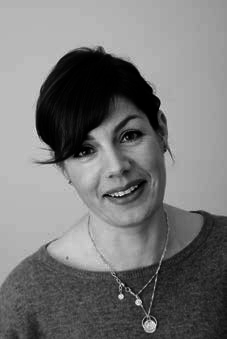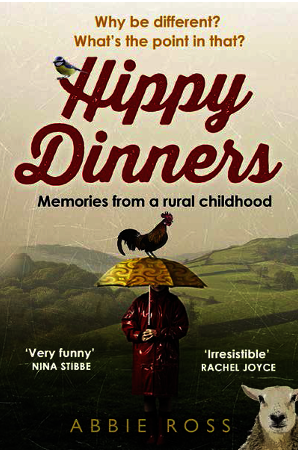‘I don’t remember being topless for your entire childhood my love, but if it helps to sell books…’

That was my mother’s first comment when she read my memoir ‘Hippy Dinners.’
She was right of course; she remained fully clothed for whole days of my childhood; it’s just that I don’t remember them quite as clearly; acute embarrassment has a way of doing that: embedding memories as fresh and detailed in your mind as if they just happened yesterday.
When I was about fourteen, for some unknown reason I decided I should write a Mills and Boon novel. I say that because I was an especially gauche and unworldly teenager who up until then had steered well clear of boys and love and scary, confusing things like that. I preferred to safely admire people from afar; people who weren’t real because they were on the telly, like John Craven and Terry Nutkins and Freddy from Scooby Doo. No chance of any of them becoming my boyfriend, thank God, and who’d want a boyfriend anyway? Bleugh! My romantic novel was set in Greece and charted the blossoming romance between handsome windsurfing instructor Yani, with eyes as black as coal, and beautiful Melody with eyes of cornflower blue. I called it The Winds of Love, because… well there was going have to be quite a lot of wind in it, what with all that windsurfing, and there would probably be tonnes of love in it too I should think.
Except that there wasn’t. Because no matter how hard I tried to imagine it, no matter how many times I listened to Foreigner’s 'I want to know what love is' I still didn’t have the first clue; and eventually, inevitably, Yani and Melody were relegated to the back of the drawer.
‘Write about what you know,’ that’s what our family friend, the writer Julia Gregson advised when I told her about my failed attempt at writing a romantic novel. I scrabbled around in my teenage mind, desperate to find something that I knew about, what did I know? Sadly very little. I knew a fair bit about Duran Duran; I also knew how to style the perfect mullet; and I could recite the entire script word for word from the film The Breakfast Club; none of which - even my clueless fourteen year old self had to concede – would make gripping material for a book. ‘Why don’t you write about your childhood,’ said Julia, ‘there’s a wealth of material there.’
Years passed. I grew up, got a job, got married and had kids; life got in the way of any novel writing aspirations, but Julia’s advice stayed with me. After I became a mother I kept thinking about my childhood and how far removed it was from the safe, urban upbringing I was giving my kids. When I was two my bohemian parents had upped sticks from London to go and live in the wilds of Welsh speaking North Wales. Why? They were looking for a simple living-off-the-land kind of existence; that’s what they said, they wanted to bring their kids up with space and freedom; they wanted grow things and make things and have views. It was a brave move, given that they didn’t speak Welsh and my dad still had a job in London and the house that they chose was right bang in the middle of nowhere. Land was cheap and available in North Wales in the 70s, perhaps that’s why it was a magnet for hippies, who moved their from the towns in their droves and set up communes in amongst the traditional Welsh hill farmers who had worked the land for generations. And then there was us - my fish out of water family - neither hippy nor Welsh farmer, where did we fit in to all this?
The stark beauty of rural Clwyd has always stayed with me: the colossal bracken covered Berwyn Mountains; the sheep filled fields stretching on and on; all that space and emptiness and freedom appealed to me more than ever now that I was living in the city. But it was the people that I knew when I was growing up, with their eccentricities and quirks; it was them that I really wanted to write about.
I started writing about Olive our next door neighbour and the way she liked to Sellotape her hair down so it dried into the perfect pudding basin, and her permanently anxious son, Phillip, who only ate orange food and preferred to go without trousers and pants because it was nice he said to ‘get a bit of air.’ There was Sara Fiddick from over the fields - I wrote about her - ‘Oi! Bitch!’ That’s how she liked to greet me, before giving me a friendly dead arm, and threatening, good-naturedly to scratch my flippin’ eyes out. I wrote about the visits from my Liberace loving suburban Jewish grandparents, resplendent in their patent leather footwear, with their deep hatred for the countryside and anything remotely bohemian, ‘Isn’t that interesting?’ Nana would say about a new painting in our sitting room, or an outfit my mother was wearing, ‘so different,’ she’d say, even though different had no good and desirable connotations for her, she didn’t like different one bit.
I wrote about the hippies in the communes, the farmers; the teachers in my school. I wrote about my mum, my dad, my sister. I carried on writing, head in the sand. It was all right, I told myself all the while, it didn’t matter, because my book was never going to get published. And then it did. And when I heard I’d got a book deal the shocked delight I felt was tempered by a nagging concern: what about the people I’d written about? How would they feel about being in a book? How would I feel if it was me?
I gave my family a proof to read. I’d take out anything they didn’t like, I’d change their names; whatever it took to make them feel ok I said. They were all remarkably gracious about it. Would I have been so accommodating? I’m not so sure. ‘Keep it all as it is, keep my name, I don’t care,’ said my Dad, with a dismissive wave of his hand, declaring that he had ‘nothing to hide,’ like he was a cowboy in some melodramatic Western. On retrospect I decided there probably was a fair bit he should hide actually, and I took out a couple of things I thought might make his grandchildren’s eyes pop out were they to ever read the book. My mum and my sister had reservations; and for my sister, in particular I think it was quite disconcerting to read. ‘I just don’t remember it like that,’ she said, simply; and she wouldn’t would she? Two people’s memories of an event are always likely to be different in some way to each other, and neither might be accurate, who can tell? If one of you decides to document it in a book, their version is presented as fact, that’s the problem.
Friends who read Hippy Dinners in advance assured me it was an affectionate portrayal of everyone featured, and they’re right, I hope; but in a funny kind of way that doesn’t matter. We all have an idea, I think, of how we present ourselves to the world, and no matter how positive someone’s portrayal of us might be, it has to be disconcerting – upsetting even – if the way you see yourself and the way that you’re seen don’t match. Like when a friend says a photo of yourself really captures you, and you look at it and think but it doesn’t, it doesn’t even look like me!
A lawyer who did a read through of the book suggested not just changing names of characters, but hair colour too, ‘that way if someone in it reads it and likes how they come across that’s fine, they’ll be pleased,’ she said, ‘and if they don’t, they’re more likely to think, that’s not me, because I don’t have ginger hair.’ She suggested changing the sex of siblings, altering cats to dogs, dogs to goldfish; just little things like that she said could help. She advised that I didn’t mention the village that I lived in by name; or the town, ‘keep it vague,’ she said, ‘don’t pin it down precisely, ‘if someone has a gripe, it will probably be someone you won’t expect, like a teacher from your primary school.’
I wrote to Olive, who used to live next door to us, to tell her that I’d written a book and there was a character in it loosely based on her… and her son… and her ex husband; promising to send her a copy as soon as I had one. She replied with the most heart-warming letter. The ten years she lived next door to us, she wrote, were some of the happiest times of her life, and my family would always hold a very special place in her heart. Why does she have to be so nice? I remember thinking; it’ll make it even worse when she reads the book and decides she never wants to speak to me again!
Once the hardback was published I went on a short book tour in Wales. When I walked into the Wrexham branch of Waterstones, to my astonishment, there waiting for me, was Olive.
‘Ooh, look at you!’ Would you look at you? Look!’ She said – her trademark greeting – squealing with delight, showering my shocked face with kisses. She’d read the book she said, and to my stunned relief she told me it was smashing, an absolutely cracking read. She’d just been telling the manager of the bookshop all about it she said. They’d been having a lovely chat. She’d told him the name of the village in the book, and the town too; because he had a map of Clwyd she said and he wanted to put it up in the window as part of the display, with stick-on red arrows pointing to where it was set.
The hour or so that followed felt quite surreal; there was a chair set out for me, and a pile of books to sign in front of a poster with a picture of the book. Olive took the seat, and settled in to chat enthusiastically to the people who’d turned up for the signing. ‘My name’s Olive in the book, she said, but my real name is ‘****’. Have you read it? Have you got to the bit with my son in it?’ Going on to tell them his real name too, ‘you think he’s mad in the book, I’m telling you now,’ she said, with a conspiratorial tap on the side of her nose, ‘she didn’t even scratch the surface with that one.’
I’m writing my second book now; a novel this time, and I’d been looking forward to that guilt-free freedom that comes from making things up. I was spoilt though, that’s the thing. It’s not so easy making up believable, interesting characters when you’ve had the gift of real ones handed to you on a plate.
‘The problem with fiction,’ Tom Wolfe once said, ‘is that it has to be plausible, and that’s not true with non-fiction.’
And that was what I enjoyed the most, when it came to my memoir: writing the implausible truth.
Abbie Ross moved from London to North Wales aged two and lived there until her family moved to West Gloucestershire when she was twelve. She has a Psychology degree from Cardiff University and worked for Aardman Animations as a senior commercial producer. She lives in Bristol with her husband and children and is working on a novel.
Comments